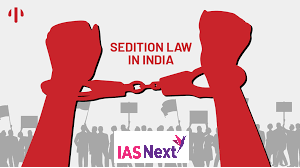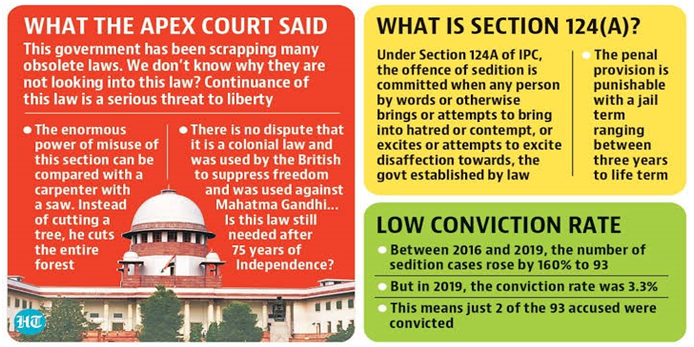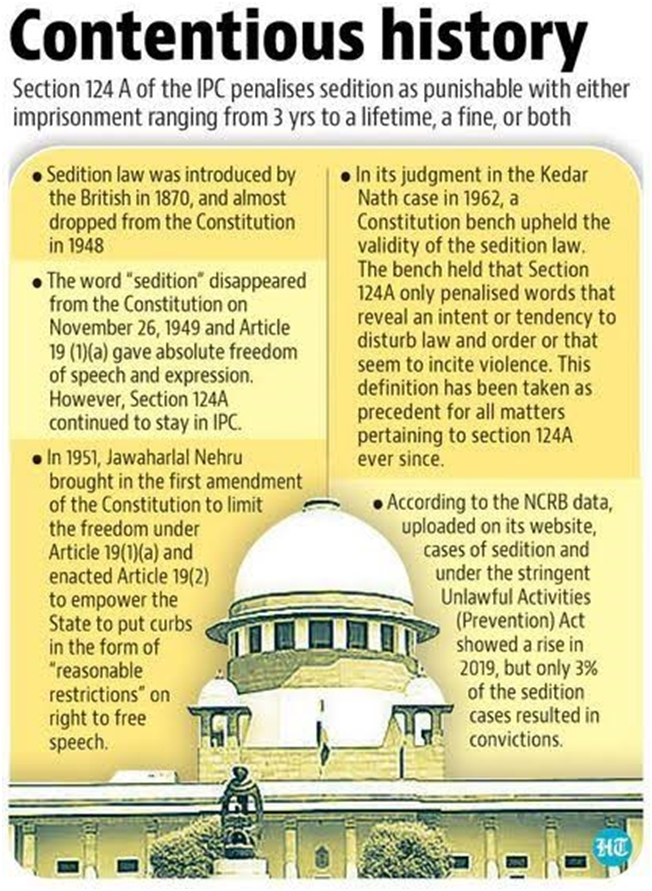CURRENT AFFAIRS
Get the most updated and recent current affair content on Padhaikaro.com
Sedition law in India
- IAS NEXT, Lucknow
- 20, Jan 2022

Reference News:-
Calling for abolishing the law on sedition, former Supreme Court judge Rohinton Nariman has expressed concern on booking critics of the government for sedition.
- He said, it is time to completely do away with sedition laws and allow free speech so long as it does not exhort somebody to violence.
Concern expressed by the former justice over its misuse:
While those exercising free speech were being booked under the stringent sedition law, those giving hate speech are not being dealt with by authorities.

What is sedition law?
The sedition law has been indiscriminately used against critics, journalists, social media users, activists and citizens for airing their grievances about the governments COVID-19 management, or even for seeking help to gain medical access, equipment, drugs and oxygen cylinders, especially during the second wave of the pandemic.
- Section 124A of the IPC states, “Whoever, by words, either spoken or written, or by signs, or by visible representation, or otherwise, brings or attempts to bring into hatred or contempt, or excites or attempts to excite disaffection towards, the government established by law in shall be punished with imprisonment for life, to which fine may be added, or with imprisonment which may extend to three years, to which fine may be added, or with fine.”
Issues surrounding its misuse:
The sedition law has been in controversy for far too long. Often the governments are criticized for using the law — Section 124-A of the Indian Penal Code (IPC) — against vocal critics of their policies.
- Therefore, this Section is seen as a restriction of individuals’ freedom of expression and falls short of the provisions of reasonable restrictions on freedom of speech under Article 19 of the Constitution.

The law has been in debate ever since it was brought into force by the colonial British
rulers in 1860s. Several top freedom movement leaders including Mahatma Gandhi and Jawaharlal Nehru were booked under the sedition law.
Relevant Supreme Court judgements:
- The Kedar Nath Singh vs State of Bihar case (1962):
While dealing with offences under Section 124A of the IPC, a five-judge Supreme Court constitutional bench had, in the Kedar Nath Singh vs State of Bihar case (1962), laid down some guiding principles.
- The court ruled that comments-however strongly worded-expressing disapprobation of the actions of the government without causing public disorder by acts of violence would not be penal.
- The Balwant Singh vs State of Punjab (1995) case:
In this case, the Supreme Court had clarified that merely shouting slogans, in this case Khalistan Zindabad, does not amount to sedition. Evidently, the sedition law is being both misunderstood and misused to muzzle dissent.
Need of the hour:
The top court has observed that the “ambit and parameters of the provisions of Sections 124A, 153A and 505 of the Indian Penal Code, 1860 would require interpretation, particularly in the context of the right of the electronic and print media to communicate news, information and the rights, even those that may be critical of the prevailing regime in any part of the nation”.